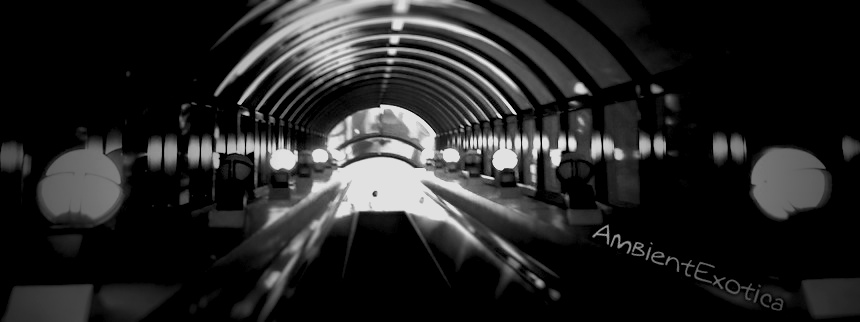
Ben Steed
From Here
You Can See Everything
2013
From Here You Can See Everything is a nine-track album by the Lincoln, UK-based musician Ben Steed, released in July 2013 on Gavin Catling’s Twice Removed Records in a limited edition of 100 CD’s. It can be ordered at Bandcamp where a digital version is also available to purchase and listen to in full. If you are a fan of Steed’s cinematic pieces, conflictive separations and forceful intertwinements, this album is a no-brainer. However, my humble suggestion to those who do not know the artist yet is to pre-listen to the material, for From Here You Can See Everything is seriously torn and weathered, or to sum things up: dualistic. And this kind of dualism is, as it turns out over the process of the album, cleverly revealed, or better still, even unleashed! All compositions are based on field recordings, piano chords, gentle guitar licks and mallet instruments in tandem with, I guess, synth remnants. If no synths are involved, then the respective source is cleverly augmented and reworked via filters to resemble the limitless possibilities of this instrument. These things are altogether technical, but with their help, the aesthetic arc comes to fruition. Neither of the tunes can be described as exhilarative, nor are there apocalyptic dimensions. The antithetical notions and theories are in a constant fight, Drone riverbeds meat Trip Hop structures, a freeing nostalgia clashes with a petrifying melancholia. This is not the first album to deliver this conflictive emotional range. But the solution and link to the album title is a coup de main I have not experienced in this strikingly cinematic way heretofore. Such an eye-opening (!) strike does not necessarily imply high-quality material, so this means business as usual for me. I dive deeper into the helixes to uncover greatness and flaws as I perceive them.
Two chords on a classic piano are the gateway to the designedly genteel opener River Revuer, a truthful piano arrangement whose tone sequences and melancholic warmth are placed in a particular way: not only does Ben Steed celebrate benignancy and contemplation, but carves out the physical gaps between the tones. The result is a wonderful decay phase, an orange-hued afterglow whose thinness is then covered by the next tone. While this is essentially the case in most piano-focused compositions, River Revuer tries to mediate between null space and harmony, but does not resolve their interdependency. This implicit duality is omnipresent in From Here You Can See Everything, but covered in the undertones and fissures. The following I Can See You No More is based on an eminently dichotomous ecclesiasticism which is further augmented due to its Drone washes cross-fading and perturbing the solemnity of the opener. Partly arcane and mysterious via its dark synth pads, probably a reminiscence to the 80’s, and partly embracing, even blissfully so, I Can See You No More is carried by a powerful, genuine lachrymosity that is neither chintzy nor de trop. The crestfallen track title does not yet fully describe the aural physiognomy which is based on the simultaneity of counterpuntal strata; the whitewashed tape hiss twirls like a purifying veil, tones in minor mesh with sudden eruptions of joy, glistening glockenspiels illumine the dun, but by no means black darkness. Like the calcined cycle of a sunburst, it fades out rather abruptly, with its reverberated final tone lacing into the distance. That this track can – and begs to – be interpreted very differently is only revealed much later.
Up next is Dhyāna, stylized as dhyāna, an enigmatic Ambient song camouflaged as a Trip Hop critter with decidedly pumping kick drums, smacking handclaps, turquoise-tinted chime spirals plus xylophone billows and the spectral echoes of a lamenting and all the more haunting Hannah Wall. Twilight remains an important factor, the pointillistic mallet instrument tittles orbit gleefully around the sawtooth dark matter pads. The ingredients do not click well together when one focuses on the Ambient aorta that floats in the background. They do, however, work flawlessly when the dark, brazen kind of Trip Hop is the listening subject's favorite genre. If Dhyāna were the only beat-driven piece, I would have called its metallic stealth structure out of place, but it astutely complements the following Why Can’t I Sleep Well?, another tune whose arrangement places a slightly more laid-back but identically texturized beat in the center. Staggering sepia-colored rhythm pianos conflate with shaken ice cubes, celestial pipe organ drones and field recordings of birds. What lies beneath the surface is most enchanting though: a fully fleshed-out accompaniment of aqueous synth-oid bubbles whose diffuse blurriness cannot diminish the pristine clarity of the source, the shimmering cavalcade of euphonies that are poured into these tiny specks. These are the highlights for me, contradictorily towering above the very constructions which actually suppress their full effect. There is too much happening at once in this song, the textures do not intermix but are clearly set apart from each other. Why Can’t I Sleep Well? hence feels enormously British, for a lack of a better term, the production quality is top-notch, spiky and edgy with a lot of oomph, but it is this very vigor and harshness which degrades the beauty of the mellow additions. This unsolvable stress ratio is – you’ve certainly guessed it – the pith of both Trip Hop tracks. From this point onwards, Ben Steed’s album grows ever-stronger.
Song For A Distant Universe has its epic proportions already engraved in its title, and it lives up to the self-imposed agenda for sure. This is a classic Ambient dreamscape with a sense of traveling and floating, and while there are similar pieces created all over the world, even in the exact moment you are reading these lines, there is nonetheless something specific Ben Steed does terrifically right during all of this song’s shapeshifting stages, and that is the plasticity of wideness. Everything meshes together like clockwork, be it the prelude phase with its cavernously echoey field recordings of crackling branches, chirping birds and far away cars, the second stage with the scoured complexion of the abysmal maelstroms and bass runlets, or the admixed acoustic guitar sparks which shuttle between tasteful Dream Pop twangs and the rusticity of bonfire-lit gatherings in the wilderness. Slowly vesiculating square lead pulses, akin to polar lights, gleam and illuminate the subterranean atmosphere. Everything is draped in reverb and hall effects all the time, and the more powerful the original source material is, the more vaulted it becomes in the setting; the passing cars are a prime example, for their engines sound like otherworldly gales. Out of space, but bound to earth. Duality? You bet! The follow-up with the simple title Thank You may be much more saturated and tangible, but Ben Steed takes the same road as the cars in the preceding track, with field recordings and languorous acoustic guitar coils being reunited here as well. The aeriform-ethereal four-note backing haze and the iridescent crystals which plink and cling in unison with this stable placenta are traversed by melancholy. Thank You is a piece that enchants the listener immediately. The simplicity and stability in its structure does not hurt, but certainly ennobles the listening experience. The loop is simply too good to turn down, it lures the listening being to dive deeper into the amicable abyss.
It is obvious that the eponymous title track From Here You Can See Everything is very important to Ben Steed, but he belittles this assertion by making it a short vignette of less than three minutes while at the same time grafting a personal poem onto the mix of wraithlike yet thin organ washes. Steed’s voice is compressed as if coming through the wires of a telephone. What his voice lacks in clarity, his poem delivers big time. It is all about the various vision-related aspects. It explains the album-related concept of ubiquitous duality very clearly. To name just one verse: “Only when the darkness of closed eyes begins to sparkle do you see the stars.” If this comforting thought is applied to the music, the second track I Can See You No More can all of a sudden be interpreted as a rapturous instance to look forward to. The album title reveals its deeper meaning, the clashing opposite spectrums of the Trip Hop-esque material are put into perspective, and it so happens that this seemingly picayune track hands over the key of understanding to those who listen closely. The only strange thing is its placement as the penultimate track. Sure enough, as an opener it would have trivialized the initial listening session in regard to its darker tones and hidden wonders. Its placement shortly before the end, however, does not feel right to me. Notwithstanding my impression, its message continues to shine within the boundaries of the album. The closer Looking Outward And Inward To A Sea Of Stars intersects with the above line off Steed’s poem and feels like a proper finale, with euphoric two-note organ washes, an equable beat on a classic drum kit and masked guitar glitters. Another short spoken line adds an additional sense of meaning to the rich gamut of interpretation, but it is far too profound and eternal to cite it here. The ensuing applause at the end of the track is justified. Captatio benevolentiae, one last trace of humanism.
A heavyweight in meaning, musing, quasi-movement and transcendence, Ben Steed’s From Here You Can See Everything epitomizes the poignancy of the inner eye which is able to make apparitions and figments visible. These formations are not exclusively triggered by the sense of sight; of equal importance, especially so in the given shape of works related to music, is the sense of hearing. Both senses conflate in Steed’s album and are interwoven in a deep sense. This dual sense is so deep that it occasionally becomes a burden. Dhyāna and Why Can’t I Sleep Well? are seemingly old-fashioned in 2013. Their slick beat structure, warbled darkness and explicated tragedy is simply alienating in a work that tends more towards Drone than sophisticated-syncopated rhythms of labyrinthine dimensions. The surfaces do not form a harmonious whole, but try to create barriers between themselves. It is hard to describe, but these pieces are too serious and overproduced. The other couple is fortunately superb: Song For A Distant Universe lives through the magnanimous amounts of vaulted hall effects and reverberating surfaces, while the follow-up Thank You epitomizes Dream Pop par excellence, but not in its original form. Its shape is rather injected into a Drone mould. These two instances show the real talent of Ben Steed to create impressive superimpositions of converging layers, and this is what I see when my eyes are closed, and this is how I perceive From Here You Can See Everything. Dualism and ambiguity are double-edged swords, Ben Steed distills the best out of the topic, but I would have wished for additional long Drone centerpieces of the mysterious and embracing kind, and less of the looming bleakness. And now to the twist: the moods I wish for are the same ones that would have destroyed the album’s aura of twilight. I am aware of this. Duality comes with a price.
Further listening and reading:
- Purchase and listen to Ben Steed's album in full at Bandcamp.
- Follow Ben Steed and Twice Removed Records on Twitter: @CosmicEschaton and @twiceremovedrec.
Ambient Review 235: Ben Steed – From Here You Can See Everything (2013). Originally published on Jul. 3, 2013 at AmbientExotica.com.
